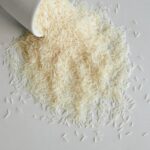Yes, dogs can safely eat barley in a moderate amount. Barley is a common ingredient in dog food and is an excellent source of soluble fiber. Adding barley to your dog’s diet will keep its digestive system healthy and regulate blood sugar.

Safe: This food is generally considered safe by the veterinary community. Dogs can eat this food sometimes or in small amounts but contains little to no nutritional value.
| Food Safety | Safe and nutritious in moderate amounts. |
| Nutritional Value | Barley provides essential fiber to keep the digestive system and blood sugar levels in control. It also provides other necessary nutrients like carbohydrates and protein. |
| Potential Risks | Eating too much barley can lead to gastrointestinal issues in dogs. A high amount of barley grass powder can also inflame the pancreas in dogs. Since barley is a carbohydrate, excessive amounts of it can lead to health issues such as obesity and diabetes. |
How Much Barley is Safe for Dogs?
Barley is essentially a carbohydrate, therefore, it should not be the main component of your dog’s diet. However, occasionally adding barely to your dog’s protein-based meals is a good idea. A rule of thumb is to ensure that your dog’s barley intake does not cross the 10 percent threshold of your dog’s daily calorie intake.
How to Safely Prepare Barley for Your Dog?
There are plenty of ways you can serve barley to your dog. The simplest and easiest way is to boil a few cups of barley powder and add it to your dog’s regular food. You can also mix it with other food and try different combinations to see what your dog enjoys best. A quick tip: Barley along with chicken and vegetables can make an excellent nutritious and balanced meal for your dog.
Frequently Asked Questions
-
Due to its high fiber content, barley can be used to treat diarrhea in dogs.
-
Some dogs can have a gluten intolerance and eating barley might cause an allergic reaction in them.







